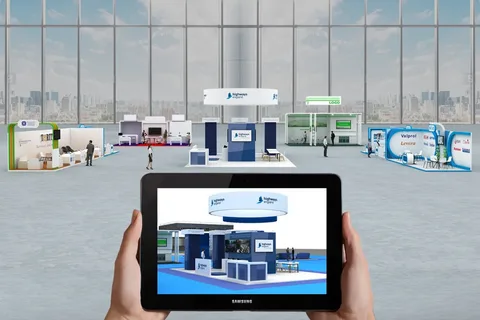Are you planning an event in 2023 that’s either online or partially online? With more and more organizations, businesses, and even individuals turning to virtual events as the primary way to connect with their members and customers, now is a great time to start preparing for how you can make your event successful. This comprehensive guide will provide insights into hosting a successful virtual event in 2023.
You’ll learn about the different types of virtual events available; essential tips for ensuring you deliver an excellent experience for attendees; best practices around using technology tools like Zoom or Webex; and how to measure success post-event. By breaking down each process step – from preparing an agenda to providing stellar customer service – you’ll be well on your way toward creating a unique virtual event in no time!
Table of Contents
Overview of the Rise of Virtual Events
Over the past few years, virtual events have seen tremendous growth with the rise of technology and digital transformation. In 2021, virtual events became more powerful with advanced features like real-time analytics, interactive content, and dynamic audience engagement capabilities.
As these technologies continue to develop and be adopted by more companies and organizations, virtual event organizers are now relying heavily on cutting-edge tools like artificial intelligence to provide a way for attendees to connect and share experiences in a completely virtual environment. The capability of hosting large-scale events virtually has opened up new revenue streams while providing opportunities to create truly unique experiences that leave long-lasting impressions.
Seeing this rapid acceleration in virtual event attendance and growth suggests that in 2023 we’ll undoubtedly see an even more significant demand for this type of event far exceeding expectations.
Choosing the Right Tools and Technology for Your Event
Putting on a virtual event in 2023 is no small task – countless logistics, hosting, and security considerations exist. Choosing the right tools and technology is among the most critical decisions when organizing an online event. Selecting a reliable live event platform ensures your virtual event runs smoothly.
The platform should provide high-quality streaming capabilities to guarantee participants a positive experience and the tools to host a webinar or conference successfully. With the right tools, you can stream video and audio, create polls and surveys, and co-host speakers and sessions while providing exceptional customer service.
By taking the time upfront to select the ideal technology for your specific needs, you can rest assured your digital gathering will be considered one of the best in 2023!
The Benefits Of Hosting Virtual Events
As the world continues to move toward a more digital-reliant lifestyle, so too should event planners looking to make their events stand out. By hosting virtual events, event organizers can benefit from increased accessibility, allowing them to reach a much wider audience than before.
They no longer need to worry about purchasing supplies or equipment required at physical venues. They can save time by eliminating the need for specific tasks such as setting up or tearing down an event. Furthermore, technology has come a long way, enabling us to provide various features that simulate aspects of in-person experiences, such as live video streaming and interactive Q&A sessions.
With the potential of virtual events, this platform should remain part of any practical event planner’s repertoire for years.
Tips for Planning a Successful Virtual Event
With the rise in the popularity of virtual events, it is more important than ever to plan accordingly and ensure that the event runs smoothly for everyone involved. Preparing for a virtual event requires setting expectations, utilizing the right technology, providing engaging content, and fostering meaningful connections with audience members.
Proper planning before the event takes place is essential to success. Critical components of this process include preparing an agenda with concise objectives and recruiting speakers and other personnel based on desired topics or skill sets. There’s also plugging into digital platforms that offer a platform where viewership can gather comfortably and interactively, creating surveys or polls to capture participant feedback after the event and forming a marketing plan to spread awareness before and after the virtual meeting.
Best Practices for Engaging Your Attendees
Attending a virtual event should be a seamless and engaging experience for your attendees. Understanding current best practices for these types of events is crucial to ensure the best outcome. Start with setting realistic expectations so that everyone involved clearly understands what taking part in the virtual event entails. Secondly, leverage multiple virtual event platforms and engage your attendees through various methods.
Utilizing interactive elements such as polls, Q&A sessions, breakout rooms, and digital signage will help connect audience members and keep them engaged throughout the event. Finally, know the latest safety measures to ensure your virtual gathering remains secure while providing an enjoyable experience for everyone involved. Following these guidelines will allow you to host successful and memorable virtual events in 2023.
How to Effectively Market Your Virtual Event
With the increasing popularity of virtual events, learning how to market your event effectively is essential for success. There are targeted marketing practices that you can employ to boost attendance and make attendees more engaged. These include creating a website for the event, utilizing social media channels and influencers, setting up email campaigns with customized visuals, and developing creative online advertising strategies.
When marketing virtually, working collaboratively with other industry leaders to build a strong network around your event is essential. Additionally, using measurable metrics such as web visits and results from surveys can help track the success of your virtual event marketing and guide future efforts.
In conclusion, as the demand for virtual events grows in 2023, organizations of all sizes can significantly benefit from hosting virtual events. Following best practices for engaging your audience and creating memorable experiences will make all the difference in making any virtual event successful.





